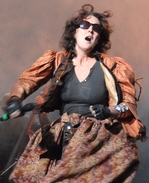SITE GUIDE
SEARCH
REVIEWS
REVIEW ARCHIVES
ADVERTISING AT CURTAINUP
FEATURES
NEWS
Etcetera and
Short Term Listings
LISTINGS
Broadway
Off-Broadway
NYC Restaurants
BOOKS and CDs
OTHER PLACES
Berkshires
London
California
New Jersey
DC
Philadelphia
Elsewhere
QUOTES
TKTS
PLAYWRIGHTS' ALBUMS
LETTERS TO EDITOR
FILM
LINKS
MISCELLANEOUS
Free Updates
Masthead
Writing for Us
A CurtainUp  London Review
London Review
 London Review
London Review Mother Courage and Her Children
| It isn't easy, starting a war, but nothing worthwhile is easy. And once you're in, you're hooked like a gambler. — The Sergeant
|

Fiona Shaw as Mother Courage (Photo: Anthony Luvera ) |
Noise. The throbbing metallic beat of military mobilization. The clang of railways and the clash of industry churning out its death-dealing hardware. This is a nightmare prelude to the ensuing drama, stark and brash and harsh and cold. A world away from industrial chic, the resulting image presents corporate industrialization of the waging of war as a dusty, dirty, noisy affair. The lone slouching figure begins to writhe on the ground, his pained physical movements mirroring our own fascinated discomfort. His seat is taken by a stereotypical soldier, an every-military-man whose role is to act as narrator and chorus. Hands cupped around microphone and foot stomping an electronic ‘explosion’ sound-effect, the soldier provides horrifically realistic sound-montages of guns and bombs percussively thundering around the auditorium.
The Olivier Theatre is at war. We are at war. A total war, a blitzkrieg -- or rather blitztheater -- waged by an army that invades our senses. All this before Deborah Warner's production of Brecht's Mother Courage and Her Children and Her Children has actually begun. Finally the stage is prepared, the vast screens in place, and the sunken stage segment rises to reveal the steel and plastic store-wagon of Mother Courage herself. Atop this strange contraption rides Fiona Shaw, her entrance as exuberant and dramatic as her astonishing performance in the title role.
In this translation by Tony Kushner, Brecht's late-1930s polemic against the rise of Fascism (which he superimposed on an obscure, for us, episode in the European Thirty Years' War of 1618-1648) is brought into twenty-first-century focus. Kushner's dialogue is course and expletive-ridden. This is the language of death and sex and war. There is no room for sympathy. We cannot empathize with the characters onstage. We vicariously share their experiences, their losses, but thankfully we are not expected to carry the burden of their guilt.
For guilt there appears to be. Mother Courage is a woman driven by necessity. It is the necessity of survival in a capitalist mercantile world in which war promises the greatest profit. Her despair at the prospect that war might end -- a war which has cost the lives of countless hundreds and thousands, including, eventually, her two sons and mute, innocent daughter -- is as distasteful as it is pragmatic. Fiona Shaw explores the depths of this character's emotions, her portrayal as epic as Brecht's anti-heroic creation could ever be.
Of course Brecht's anti-war message rings loud and clear. Of course the timelessness of its politics makes it as relevant today as it did seventy years ago. Something, though, is lacking. Perhaps exiled in Switzerland and eventually the United States, artistically rebelling against a regime which threatened European and world stability in the mid-twentieth century, Brecht could produce a drama which some consider the most important play of its time. He had a tangible enemy, one shared in retrospect by all just and right-minded people.
It makes for uncomfortable viewing, therefore, when the object of disdain is translated into the militarism which drives twenty-first-century political and industrial decision-making. No longer an attack against the rise of Fascism, with its unstoppable war-machinery, Mother Courage and Her Children has to become a play which attacks the fabric of our everyday consumerist lives and political decisions. It is a matter for personal conscience how far this message can and will ring true. What cannot be denied is the very worthiness of the play's message might also be its ultimate theatrical downfall.
Forced by circumstance alone to drag her cart across the fighting grounds of Europe, Mother Courage personifies perseverance at its most heartless. Necessity might be the mother of invention, but invention is, unfortunately, most innovative when driven by the necessity of war. As theatrical experience, the National's production of Mother Courage and Her Children is often brazenly, outrageously adventurous. Ultimately, though, its message becomes muddied in the blood and grime which it so forcefully and noisily depicts.
| Mother Courage and Her Children
Written by Berthold Brecht Translation by Tony Kushner Directed by Deborah Warner Starring: Fiona Shaw With: Anthony Mark Barrow, William J Cassidy, Johannes Flaschberger , Jonathan Gunthorpe, Stephen Kennedy, Youssef Kerkour , Martin Marquez, Louis McKenzie, Kyle McPhail, Siobhán McSweeney, Harry Melling, Eleanor Montgomery, Stephen O'Toole, Charlotte Randle, Guy Rhys, Clifford Samuel, Gary Sefton, Roger Sloman, Colin Stinton, Sophie Stone, Morgan Watkins, Sargon Yelda The voice of Gore Vidal Set Design: Tom Pye Costume Design: Ruth Myers Lighting: Jean Kalman Sound: Andrew Bruce and Nick Lidster Video Design: Lysander Ashton and Mark Grimmer Musicscape: Mel Mercier Songs: Duke Special Running time: Three hours ten minutes with one interval Box Office: 020 7452 3000 Booking to 8th December 2009 Reviewed by Kevin Quarmby based on 9th October 2009 performance at the Olivier Theatre, National Theatre, South Bank, London SE1 (Rail/Tube Tube: Waterloo) |
|
REVIEW FEEDBACK Highlight one of the responses below and click "copy" or"CTRL+C"
Paste the highlighted text into the subject line (CTRL+ V): Feel free to add detailed comments in the body of the email. . .also the names and emails of any friends to whom you'd like us to forward a copy of this review. You can also contact us at Curtainup at Facebook or Curtainup at Twitter |




